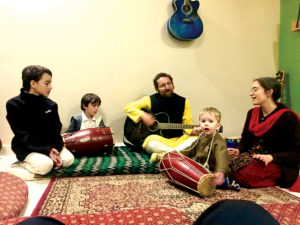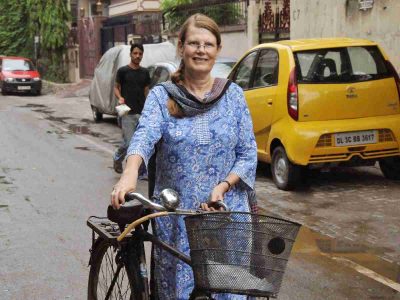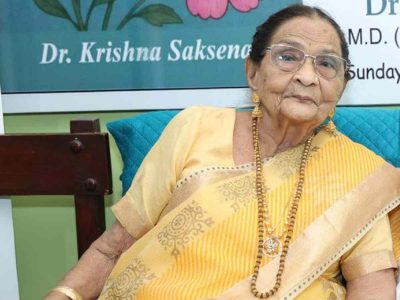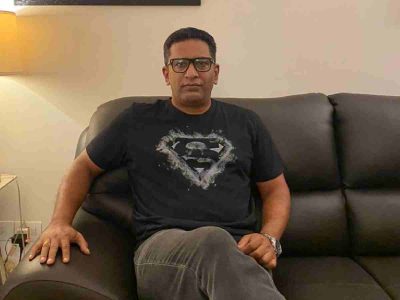Many expats come to Kumbh from all over the world to seek spiritual solace and out-of-body experiences
India has been of interest to many nirvana seekers from the West, not just the desi brand of sadhu and sant. Meditation, yoga, occult, yajna and various cult practices, are a source of fascination. The Kumbh Mela attracts many nirvana seekers from all over the world who are seen roaming around — some sporting dreadlocks, others seemingly under the influence, a few others sharing a tent with a Naga sadhu and many in Indian attire soaking in the sun.
They all have interesting stories to tell about their tryst with divinity. Some are so fascinated with the Indian way of life that they have adopted India as their home and have been living here for years with their families.
One such person is Michael Balonck, who performs Bhojpuri songs, some written and composed by him, at the Kumbh Mela. He has already shown his talent at various other forums. In his mid-30s, Michael is not a stranger to Prayagraj. He has been living here for the last six years with his wife Amanda and three sons — Micaiah, 11; Samuel, 7 and Benjamin Anand, 2.
Both Michael and Amanda are from upstate New York, and theirs was love at first sight when they were 17. Their coming to India and making Prayagraj their home “wasn’t planned,” says Amanda. They never imagined that they are going to stay for so long, long enough for their children to think it’s their home country.
But it was not easy at first, Amanda was sexually harassed. She started wearing salwar kameez, and the eve-teasing miraculously stopped ever since she started sporting sindhoor and a bindi on her forehead. The message is clear: a married Hindu woman is not to be assaulted.

Michael is trained in western classical music and is pursuing PhD, for which his area of study is the sociological and anthropological impact and cultural change of Bhojpuri songs in the areas where this dialect is spoken.
He will finish his PhD later this year. Using music as scientific data is an interesting way of analysing the society. He moves around the city on his bicycle, and before their third son was born, the family of four would commute on one bicycle. They were in the news in the local papers not for a whole family using a bicycle to commute, but for the fact that each of them wore a helmet.
Amanda has a full-time job to home-school their children on American curriculum. The trio is learning Hindi as a foreign language for their American curriculum. They love to play music and approve of the choices their parents have made.
Michael wears many caps, one of them is that he’s one of the ‘Kumbh Mela Mitra’ or member of the receiving committee, also keeps vigil on the crowd and informs police of any suspicious behaviour or activity. His family is an excellent example of having integrated into the Indian way of life without having to shun their own belief system — they sing bhajans for Jesus Christ like Hindus do aarti. They read the Bible in the same way as Ramayana or Gita is read. They are not certain of the future, but they want to stay longer in India, perhaps shift to Varanasi where he intends to do post-doctoral.
At the Kumbh, two Germans were sleeping in a tent belonging to a middle-aged Naga sadhu of Juna Akhara. They stayed overnight and were so stoned that they got up late in the afternoon. They took Indian names, Babul and Bunty. They were in their mid-20s, just finished Masters in Science from Heidelberg University. Bunty had read varied translations of Gita in either English or German and believes that renunciation is the best way to deal with the clutter of life. He was dejected that the Nagas refused to take him along with them for the holy bath, even though he agreed to go naked and smeared ash on his body like them. He was persuaded not to even try that in Kumbh as it might offend one of the Maha-mandaleshwars.
Julia and Thomas (pronounced as Toma) are in their late 50s live in suburbs of Paris. They have been coming to Allahabad since 1989 to attend the Kumbh and plan to stay for two weeks practicing meditation on the banks of Ganges. Julia wears saree like a native, while Thomas has taken liking for kurta-pyjama with Nehru jacket. “People will mistake you for an Indian politician,” Julia teases him. They walk 15 km every day in the city of tents.
All the foreigners are confronted with the same questions a hundred times, “Where do you belong to? Your country, please?” And some of them, like this skinny Belgian with dreadlocks, even before someone utters a word to him says, “Namaste! Mai Mike, Belgium ka rahnewala hoon.” He’s a musician who lives in Leipzig, Germany and likes to sing in an altered state of consciousness.
Jensen ‘Prabhu’ Martin is a 25-year-old tall man with blond curly long hairs that glow in the sun, I that can be mistaken for dreadlocks. He belongs to Los Angeles and has been practising meditation for the last nine years.
A follower of Paramhans Yogananda, he is in the final year of Masters in Yoga Sciences from Loyola Marymount University in the US. He takes dip in the Ganges daily and will be staying here for the whole duration of the Kumbh Mela before he travels to South India for his research work that’s in the realm of spirituality.
Spirituality is not merely an academic interest to him, though, he has practiced it well and has had many out of body experiences. But feels his progress is slow, and whenever he comes to India, especially in the Himalayas, the pace of his spiritual growth is hastened. One of the things he’s doing is looking for a guru in flesh and blood.
To live in Kumbh is not easy. Thousands of bonfires are lit at night, which makes his eyes itch as he walks back to his camp. Yet he stays on, looking for new frontiers of spiritual engagement.
Days spend in Kumbh are a mystical time. The Ganga’s powers are not a myth, many nirvana seekers say they experience it.





